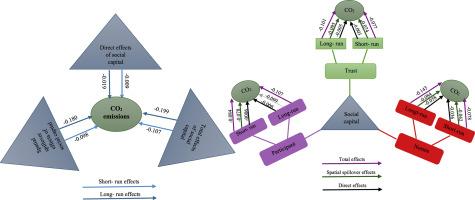社会资本溢出是否影响二氧化碳排放?
IF 10
1区 环境科学与生态学
Q1 ENGINEERING, ENVIRONMENTAL
引用次数: 0
摘要
虽然有许多研究考察了影响二氧化碳排放的因素,但社会资本对二氧化碳排放的影响仍然是一个重要但研究相对不足的领域。本研究通过考察社会资本及其维度(信任、规范和参与)对二氧化碳排放的空间溢出效应,填补了文献中的一个关键空白。利用空间德宾模型(SDM)和伊朗28个省份2005 - 2020年的数据,本研究捕捉了社会资本的直接效应和溢出效应。结果表明,社会资本对CO2排放的直接效应、空间溢出效应和总效应均为负,且具有显著的统计学意义。同样,作为社会资本的关键维度,信任、规范和参与的直接、空间溢出和总效应也是负向的,且具有统计学意义。重要的是,研究结果表明,社会资本及其维度的长期效应比短期效应更为显著,这表明社会资本的环境效益随着时间的推移而增强。通过揭示社会资本影响减排的机制,本研究强调了区域合作的重要性,并为基于证据的政策制定提供了宝贵的见解。本文章由计算机程序翻译,如有差异,请以英文原文为准。

Do social capital spillovers affect CO2 emissions?
While numerous studies have examined the factors influencing CO2 emissions, the impact of social capital on CO2 emissions remains an important yet relatively understudied area. This study addresses a critical gap in the literature by examining the spatial spillover effects of social capital and its dimensions — trust, norms, and participation — on CO2 emissions. Using the Spatial Durbin Model (SDM) and data from 28 Iranian provinces spanning from 2005 to 2020, this study captures both direct and spillover effects of social capital. The results indicate that the direct, spatial spillover, and total effects of social capital on CO2 emissions are negative and statistically significant. Similarly, the direct, spatial spillover, and total effects of trust, norms, and participation, as key dimensions of social capital, are also negative and statistically significant. Importantly, the findings reveal that the long-run effects of social capital and its dimensions are more substantial than the short-run effects, suggesting that the environmental benefits of social capital intensify over time. By uncovering the mechanisms through which social capital influences emissions reduction, this research underscores the importance of regional collaboration and provides valuable insights for evidence-based policymaking.
求助全文
通过发布文献求助,成功后即可免费获取论文全文。
去求助
来源期刊

Journal of Cleaner Production
环境科学-工程:环境
CiteScore
20.40
自引率
9.00%
发文量
4720
审稿时长
111 days
期刊介绍:
The Journal of Cleaner Production is an international, transdisciplinary journal that addresses and discusses theoretical and practical Cleaner Production, Environmental, and Sustainability issues. It aims to help societies become more sustainable by focusing on the concept of 'Cleaner Production', which aims at preventing waste production and increasing efficiencies in energy, water, resources, and human capital use. The journal serves as a platform for corporations, governments, education institutions, regions, and societies to engage in discussions and research related to Cleaner Production, environmental, and sustainability practices.
 求助内容:
求助内容: 应助结果提醒方式:
应助结果提醒方式:


